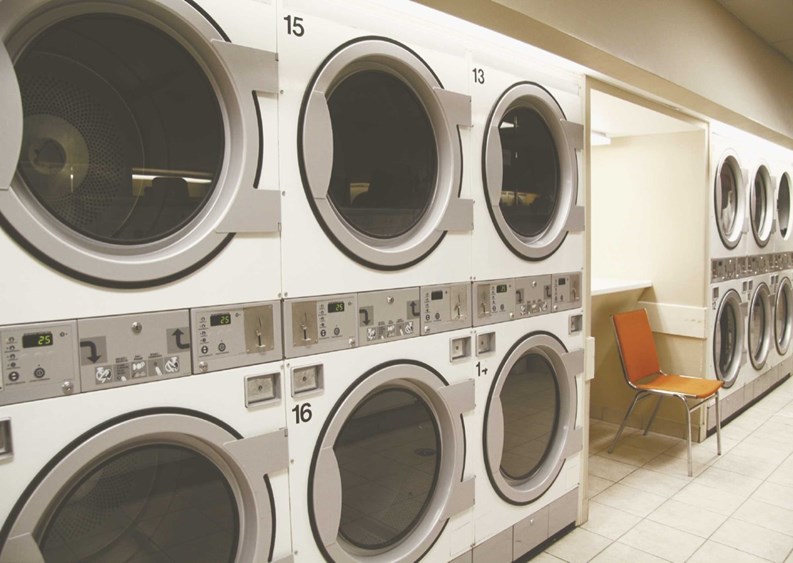There comes a time in every New Yorker’s life when they are faced with a situation so grave, so urgent and so daunting, it can make even the toughest East Coaster crumble and cave: Laundry Day.
Many have the tools to survive even the largest piles of socks and undies. Armed with a roll of quarters, an economy-sized jug of detergent, a wheeled granny-cart and a copy of War and Peace to read while they wait, every day thousands of citizens lug their laundry to the nearest laundromat (or cough up the money to drop it off with a professional service).
Then there are the lucky co-op and condo residents, who have a laundry room in their building. Those who have an in-building laundry room count their blessings and their quarters but might not realize that nearly all co-op/condo laundry rooms are managed and maintained by outside laundry contractors who take care of, service and collect money from the machines.
Not Your Grandma's Laundry Room
Just as couples negotiate over whose turn it is to fold, there are a number of different ways buildings negotiate contracts with laundry vendors, and even more options when it comes to the type of machines and services a building can choose from.
Many co-ops and condos want to have the most innovative, state-of-the-art laundry machines in their building. Denise Savino-Erichsen, president of Automatic Industries in Hempstead, says, “While folks still need to wash their clothing, the methods of doing so have changed. Naturally, when installing new laundry rooms, energy efficiency is a major factor. More and more co-ops and condominiums realize the importance of saving energy and water. As time progresses, coin operated washers and dryers are becoming a thing of the past. Most people recognize and appreciate the convenience of laundry-card systems.”
Neal Milch, CEO of Laundrylux in Inwood concurs, adding that "as condo/co-ops go green, so goes the laundry room. There has been a massive switch from top-loading machines to front-loaders because it saves an enormous amount of water and energy.”
Savino-Erichsen predicts that going green will be the priority in the next decade. “Energy efficiency and convenience are on the top of the list for board members and residents,” she says. “The manufacturers have been telling us that eventually they will mandate Energy Star-rated machinery in multiple dwelling environments. If buildings can install machinery that utilizes a third of the water than traditional washers were using, why wouldn’t they?”
Most experts agree that in addition to the environment, the future also holds more ease and convenience for laundry users. Mike Arbus of Mac-Gray Services in Hoboken, New Jersey explains that “the continued transition to the majority of laundry rooms going 'cashless'—being operated via Smartcard and credit/debit cards—is on the horizon.”
Savino-Erichsen agrees. “The card systems are terrific,” she says, “and they are being perfected as technology improves. Currently they are developing a system that allows folks to scan their credit card on the machine, similar to the way an EZ pass works. This system, when perfected, should reduce installation costs and the need for a secondary card.”
Who Do You Call?
But who is in charge of installing these new card systems and changing out older machines for new, more energy-efficient ones? The answer lies in the relationship between the building and laundry company. Arbus explains, “The basic agreement has the laundry company 'leasing' out the space—the laundry room—operating, servicing, and collecting all monies from the equipment, and paying the building a pre-negotiated rent per month, which is a percentage of the overall collections minus the amount the laundry company needs to amortize their investment.”
While this all might sound a bit complicated, it’s a relationship that actually makes things much simpler. “It is in a building's best interest to contract with professional laundry company,” says Savino-Erichsen. “When the right professional is in place, it's one less thing that the board and building manager have to concern themselves with. In addition to reducing the headaches associated with running their own laundry room, first and foremost, the building has no capital outlay for the cost of machinery. The laundry company is responsible for providing the machinery and the costs associated with repairs and maintenance of it. Inevitably there will be service needed, and the laundry company will conduct all the repairs. Regardless of however many parts that are replaced, the building is not billed additionally. In addition to footing the cost of the equipment, the laundry company leases the space and pays the building a rental fee. It’s an amenity that is producing income. To me, it’s a no-brainer.”
Andrew May, president and CEO of Hercules Corporation in Hicksville agrees. “The relationship between the building, the management company, the building’s board and the laundry company begins even before the actual installation date,” he says. “It’s more about the initial business relationship that we form with all parties once we’re brought in to survey the laundry room and then provide a proposal outlining exactly what we propose to provide.”
After the initial installation, companies like May's generally are available 24/7 for any emergency repair or replacement need that may arise. “In this business, it’s all about long term relationships,” says May. “And the key to these long term relationships is not only having a reliable product but having both exceptional technical service as well as the customer service that you provide to everyone associated with that building, especially the building’s residents.”
Anyone who has had a washer full of standing water and a machine that won’t work realizes the importance of functional, reliable machines. And while residents might refer to the washer/dryer as “our washer/dryer,” or “the building’s machines,” Automatic Industries, for example, actually owns the machines—from spin-cycle to permanent press. “The majority of the buildings that we service, we own the machinery,” says Savino-Erichsen. “Included in the services that we provide, we decorate the space, including furnishings and paint. We provide equipment, conduct all repairs, carry insurance and pay the building a rental fee for the use of the facility.”
Sometimes, as Arbus says, “A building will purchase the equipment…but will have a laundry company manage the laundry via a monthly service or management contract.”
Working Out the Details
If you are in the market for a laundry room upgrade and the conveniences that come with it, many questions arise. The average laundry contract is between five and eight years, and contract re-negotiation (or initial negotiation) begins with a sales rep from your chosen company. Savino-Erichsen suggests that a building/manager can start the process by putting together a “wish-list” of their needs and priorities. “Face-to-face meetings never hurt,” she says. “It is a good idea for a representative of the property to be on-site while the vendor is conducting their survey of the property.”
If you find yourself torn between two different companies, invite them to a board meeting. “It is not uncommon that the two final contestants in the bidding process attend a board meeting to finalize any details,” Savino-Erichsen adds.
Once a laundry room is installed, reasons for re-negotiating a laundry contract include unhappiness with the current laundry provider, need for more energy-efficient machines, expiring contract, and/or room redecoration or construction.
Milch says that a desire to upgrade equipment based on tenant dissatisfaction with old, broken down equipment which launders poorly is one reason for re-negotiating a contract. “Today, building owners realize, especially in a down economy, that better laundry is a selling point. Keeping tenants happy and lowering costs is important,” he says. Arbus adds that “being able to secure enough of the overall [monetary] collections from the equipment, while providing the building exactly what they desire for the laundry room” are the laundry vendor’s main concerns during the re-negotiation process.
When a building does decide to break up with their current laundry vendor, it’s typically bye-bye to the machinery. Savino-Erichsen explains, “At the end of a contract term, the vendor will remove their machinery and the plumbing and electrical will remain the property of the building.”
As laundry rooms change in efficiency, payment type and contract re-negotiations, Savino-Erichsen understands that there is a transition period for users. “It is interesting to see folks get into a tizzy when they have to change their laundry habits. Senior citizens especially fall to pieces when they realize they can’t use quarters anymore. Adjusting to using less soap in the new high-efficiency washers is also a learning curve. It takes folks a few times to realize their clothing can come out clean using less soap and water. It is helpful when the vendor holds instructional seminars educating the consumers on how to use the new machinery. It is rewarding to go back to a building a month after the new machinery has been installed and see how the residents change their perceptions. They learn to love the new system and machinery. It is just a matter of getting used to something different.”
Perhaps in the next decade, laundry vendors can also solve the mystery of where all of those missing socks go.
Rebecca Fons is a freelance writer and a frequent contributor to The Cooperator.







2 Comments
Leave a Comment